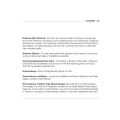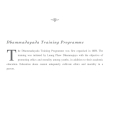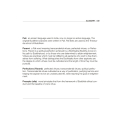Ethical Teaching : ค้นหาหนังสือธรรมะ หน้า 3 / 4
หน้าหนังสือทั้งหมด

159
Glossary of Buddhist Terms
GLOSSARY 155
Dhamma (Skt. Dharma): the truth; the natural condition of things or beings; the law of their existence; the ethical code of righteousness; the whole body of religious doctrines as a sys
This glossary outlines significant Buddhist terms. Dhamma refers to truth and the natural law of existence as taught by the Buddha. Dhammacakkappavattana Sutta is recognized as the Buddha's first teac

10
Delicate Love and Buddhist Values in Relationships
Delicate Love
Buddhist traditions serve as wonderful guidelines for
a couple's married life. If we are to study Buddhist
traditions, we will learn to distinguish which actions
are appropriate and inap
Delicate Love discusses the guidance provided by Buddhist traditions for couples in their married life, emphasizing ethical actions and the importance of The Five Precepts. It contrasts modern views o

63
Raising Responsible Children: The Role of Parents
Part Two: Raising Children
perjury. We should help them as much as possible, but
all within the boundaries of the laws that govern us.
• Guru: We must practice a high level of morality in order to
be
In raising children, it's crucial for parents to establish high moral standards and maintain dignity to gain respect. Practicing roles as wise counselors allows parents to instill ethical values in th

146
Truth for the Family: The Five Precepts
Part Five: Truth for the Family
of infringing upon all the other precepts. Hence, the
Fifth Precept reminds us not to consume intoxicants
to maintain our true nature.
Thus the Five Precepts are:
1. Do
The Five Precepts offer a framework for living an ethical life that enhances our humanity. They include refraining from killing, stealing, adultery, lying, and consuming intoxicants. Adhering to these

130
Journey to Joy
Journey to Joy
130
I aim to provide the right climate so that
people can make their own choices to change
their life actively for the better. According to
experience, a personal choice for a new conce
This text discusses the importance of creating an environment for individuals to make their own choices to improve their lives. It highlights how personal choices are effective in breaking bad habits

78
Dhammadayada Training Programme
Dhammadayada Training Programme
The Dhammadayada Training Programme was first organised in 1972. The training was initiated by Luang Phaw Dhammajayo with the objective of promoting ethics and moralit
The Dhammadayada Training Programme, established in 1972 by Luang Phaw Dhammajayo, focuses on enhancing ethical values and moral development in youths alongside their academic pursuits. Recognizing th

144
Observing the Five Precepts: A Path to Goodness
How do you keep the Five Precepts intact? Conclusion
When I was a student, I started training myself to observe Let
The text discusses the importance of the Five Precepts in Buddhism and shares a personal journey of learning to observe them. The author recounts a practice from their student days of making daily res

93
Wisdom from Meditation
From a spiritual point of view, wisdom gained from meditation will help us become more ethical in our decision-making and also our choice of action. We will become more at ease with ourselves and our
From a spiritual perspective, wisdom gained from meditation fosters ethical decision-making and personal ease, leading to a harmonious family life and improved parenting. Regular meditation elevates t

163
Understanding Pali and Parami in Buddhism
Pali: an ancient language used in India, now no longer an active language. The original Buddhist scriptures were written in Pali. Pali texts are used by the Theravada school of Buddhism.
Parami: a Pa
Pali is an ancient language from India that is no longer actively spoken but holds significant historical importance as the original language of Buddhist scriptures. These scriptures serve as a core e

167
Understanding Wisdom and Wrong Views
Wise (pundita): A wise is someone who has wisdom. Being wise is not the same as being educated. A wise can be a person who is highly educated or one with no formal education at all. He is righteous an
This text highlights the distinction between being wise and being educated, emphasizing that wisdom is innate and ethical rather than solely academic. A wise person embodies righteousness and possesse

53
Self-Development and Teacher Training Initiatives
Meeting #8
January 03, 2010
Today I am here with Luang Pi Joshua and Luang Pi Anurak. I have just returned to Bangkok and the Wat, after spending the end of 2009 in New York, helping my daughter move
In this meeting, various educational initiatives are discussed, focusing on self-development programs and teacher training. Projects include a Self-Development program inspired by the Five Rooms and S

56
The Journey of Self-Improvement
Suzanne Jeffrey
with a common goal of ethical behavior. They are happy! And they meditate to become better people. They are all trying to be good people. 'Bad' people, of course, will try to fix ever
This passage reflects on the notion that true self-improvement starts with personal responsibility. It emphasizes that good people focus on helping themselves before attempting to assist others. The d

66
Five Aspects of Personal Development
Suzanne Jeffrey
medicine? There are five aspects to this. The first, as I just said, is quantity. How much do we have? If we have too much, then we are spoiled and careless with our things, and we be
เนื้อหานี้กล่าวถึงห้าแง่มุมสำคัญในการพัฒนาตนเอง ได้แก่ จำนวน (หากมีมากเกินไปอาจทำให้เราหยาบกระด้าง, หากมีน้อยเกินไปอาจทำให้เราโลภ) คุณภาพ (พิจารณาคุณภาพของสิ่งที่เรามี เช่น อาหาร การศึกษา) เทคนิค (วิธ

111
The Path to Self-Development and Ethical Living
Suzanne Jeffrey
tions, although in the beginning of our life, when we are developing our habits, our six
directions give us total input - in other words, we are in-taking all the information that
wil
This text discusses the importance of self-development through six directions, emphasizing the role of ethical living and the teachings of Buddha in understanding one's mind and actions. It highlights

128
Mappings with a Dharma Master
Mappings with a Dharma Master
we first start with our own individual self and then work outward in all directions.
“The six directions start with the smallest unit, ourselves. We are in the center o
The text discusses the importance of individual self-awareness and ethical behavior in shaping relationships and society. It emphasizes that one must start with self-improvement through meditation and

42
Youth Training in Creative Development
…e development of moral discretion. The courses directly address the child's dilemma of how to apply ethical teachings to the modern classroom environment of technological progress and competition. As part of their ac…
This program focuses on youth aged 11-14, aimed at enhancing good manners and creativity through engaging courses. It helps children navigate ethical dilemmas in today's tech-savvy classroom by incorp

43
National Dhamma Quiz Contest
The text in the image is:
"National Dhamma Quiz Contest
The Dhamamkaya Foundation in co-operation with the International Buddhist Club have arranged a yearly peace and ethics education curriculum wh
The Dhamamkaya Foundation, with the International Buddhist Club, organizes a yearly peace and ethics education curriculum that features a quiz contest for schoolchildren, university students, and mili

74
Earth Day Activities by Dhammakaya Foundation
Earth Day Activities
Each year the Dhammakaya Foundation and its centres sponsor and organize a number of Earth Day activities for people from all walks of life. These activities include tree plantin
Each year, the Dhammakaya Foundation organizes Earth Day activities like tree planting and training in forest conservation, waste management, and cleanliness. Emphasizing moral and ethical education,

75
Promoting Inner and Outer Environmental Health
On Earth Day 22 April 1999 the Dharmmakaya Foundation has also focused on the concept that the way a person treats his or her outer environment springs from the condition of his or her inner environme
On Earth Day 22 April 1999, the Dharmmakaya Foundation emphasized that treating the outer environment reflects the condition of one’s inner environment. Young people are encouraged to nurture their in

79
Father's Day and Massed Male Meditation Retreat
Father's Day and Massed Male Meditation Retreat
This ordination programme held for the first time in 1998 was a wildly phenomenon. It was the first time that about 100,000 men astonished the world by
The first-ever ordination program initiated in 1998 culminated in a spectacular event from January 29-31, 1999, at Wat Phra Dhammakaya, Thailand. Approximately 100,000 men gathered to practice moral a
